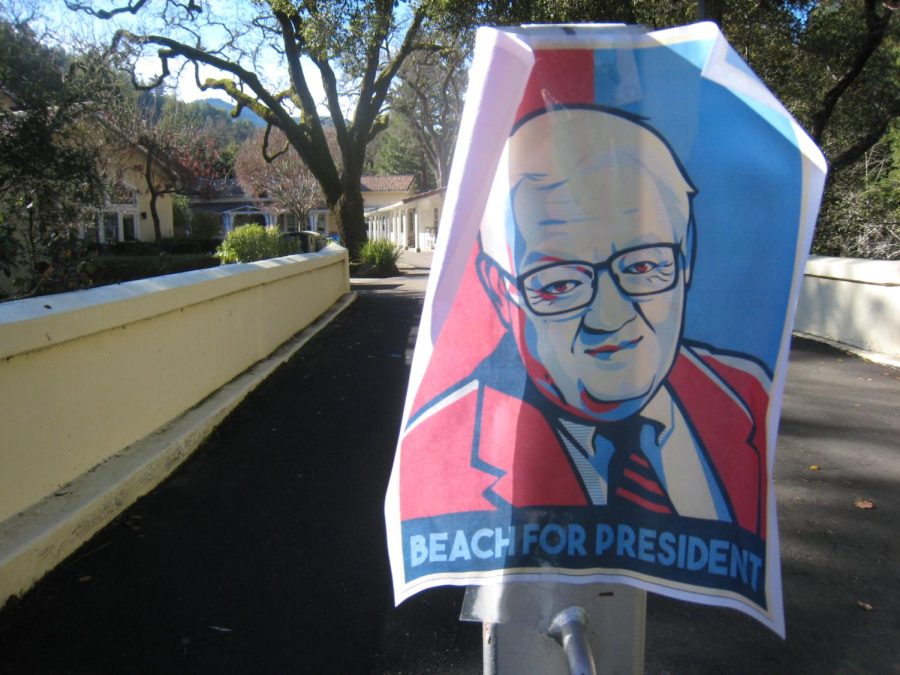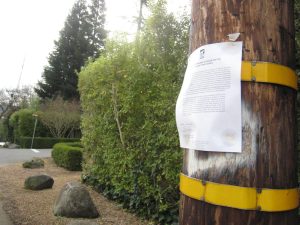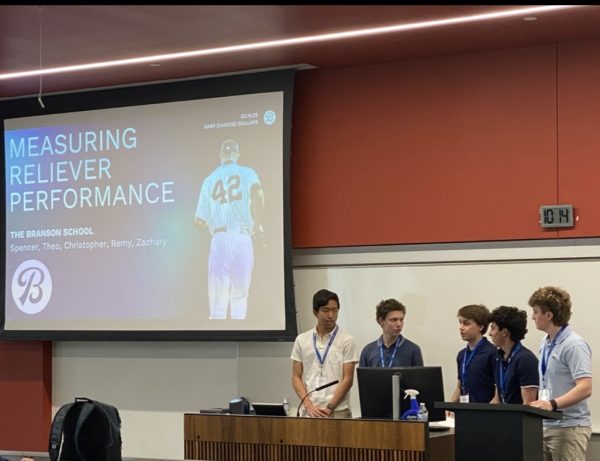The Kuhl way: Ross councilman reflects on Branson’s growth
A “Beach for President” sign in January 2022. Councilman Beach Kuhl became an overnight sensation after a Town Council meeting that month.
On the heels of a marathon, six-hour-long council meeting in January, nothing seemed clear. The Ross Town Council did not decide whether Branson could grow its enrollment. And the future of Branson itself seemed to be in question.
But one thing was clear: where Beach Kuhl stood.
“I think he was the voice of reason among lots of people who were determined to stop the school from expanding, and as a student I was happy to have someone stand up for us as an institution,” Julia Haase, a sophomore, said. “And I was disappointed that he seemed to be on his own in his beliefs.”
Amid the acrimony of the previous night, he had remained resolute that the town should not overly restrict the school. That determination fueled an overnight wave of popular admiration at Branson. The next morning, several “Beach for President” posters appeared on campus.
Not that he made much of his newfound celebrity.
“I didn’t take it too seriously,” the mayor pro tempore said. “I thought it was funny, no big deal.”
Yet this nonchalant, straightforward attitude also defined Kuhl throughout the council meetings and endeared him to many viewers. His quotable quotes — “So what?” he said of complaints about home football games — stood out during the lengthy meetings, but a decade of service to local government preceded them.
Kuhl joined the Marin County Civil Grand Jury in 2011, where he learned about government in Marin. He “didn’t want to waste” what he had learned, he said, so he ran as a write-in candidate for the Town Council in 2012 and won re-election in 2016.
In the subsequent years, Branson began to seek an enrollment increase beyond the 320 permitted by the town. At one point, the school proposed to move its campus to Strawberry, but by 2019 it had started to pursue plans to expand in Ross.
“I thought that the original thing that limited the school to 320 was not well-advised — was kind of silly,” said Kuhl, who spoke with school officials then. “So, I concluded that the school should be permitted to increase its enrollment.”
After the passage of Measure F in 2020, the school prepared an application to the town for a change to its use permit. Branson submitted the application in March 2021, when town staff started their review of the plans.
And that’s when Kuhl started to get concerned.
“I was concerned that it took too long for the town to respond to the application,” Kuhl said. “Usually, we deal with things in three or four months or so after they’re filed. And I just thought this took too long.”
When the matter finally arrived before the council in January, Kuhl didn’t expect it to take so long for approval, especially after months of town review. And though he remained quiet during the early hours of the meeting, he spoke up after other members of the council proposed new restrictions.
“Government which governs least governs best,” he said, recounting a phrase he embraced during the meeting. “I don’t think we ought to be sticking our noses into people’s affairs.”
But some restrictions proposed by the other council members especially irked Kuhl. Councilwoman Elizabeth Brekhus’ proposal to restrict all additional students by a geographic radius stood as an example.
“And as to that remark, I thought it was racist,” he said. “As soon as I heard it, I thought, oh my God, we’re going to get attacked for being racists.”
In an email Monday, Brekhus defended her proposal, saying that even if all additional students were white, the school could still have non-white students among its original 320.
Nonetheless, Kuhl continued to pillory what he saw as the council seeking to “micromanage things.” In the subsequent two meetings, he opposed new provisions — calling restrictions on amplified sound “pretty dumb” — while Brekhus, Mayor Elizabeth Robbins and Councilwoman Julie McMillan pushed to examine further restrictions.
“How we ever got off onto whether you could have loudspeakers at football games has nothing to do with the issues we are facing,” he said.
Brekhus and Robbins defended the process. And at the final meeting before approval, Brekhus said Branson’s supporters at the public hearing sessions “left no room to voice concerns” by others, though some did speak.
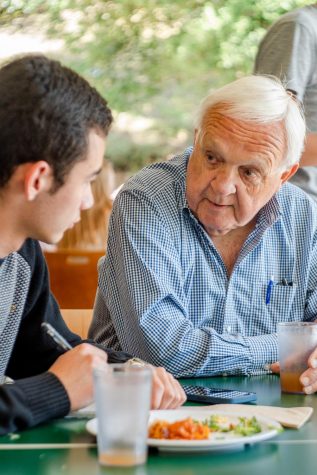
But the process, whether draconian or thorough, has concluded. Branson can expand by 100 students, albeit with several restrictions. Despite his reservations over the final plan, Kuhl said he’s made peace.
“We got Branson what they wanted — more or less what they wanted. And that’s the important thing.”
Kuhl had run for a third term because of the enrollment project, as well as local flooding issues. He’ll retire in 2024, when he’ll turn 88 years old. Until then, he’ll continue to serve as a Ross councilman, though the legacy of the Branson issue remains.
“I just thought this whole process was the wrong way to go. I still got along fine with the other folks,” Kuhl said, though a fellow councilwoman had called him over “making faces” during a meeting, he added.
Across town, at Branson’s campus, the reception to Kuhl’s conduct has been decidedly warmer. Last Thursday, he visited during lunchtime. Several students greeted him with effusive praise and gratitude for his support.
“It’s nice,” he said of visiting campus. He laughed when students broke out in applause after someone toppled a pile of dirty plates in the commons.
Some students recognized him from the posters that had appeared on campus that January morning.
“When I walked in and saw that beautiful ‘Beach for President’ sign, it just really made me understand what an impact Beach is having on our community,” Wilson Wendt, a sophomore, said. “He’s such a leader. He really doesn’t care about how the public views him. He just cares about what’s right for his constituents.”
It remains unknown who made the posters, said David Hanson, Branson’s chief financial and operating officer. Nevertheless, in another example of Kuhl’s overnight fandom, Hanson paid to make T-shirts with the image.
For Kuhl, if anything has resulted from the process, the admiration at Branson, from the posters to the recognition, has left him with a laugh.
“I’m glad it created the opportunity for all this amusement.”
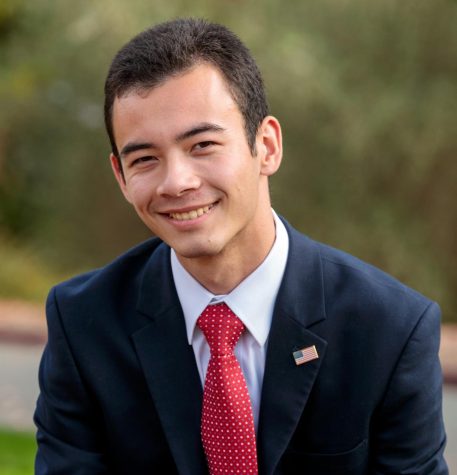
Shun Graves served as editor-in-chief and first joined The Blazer in 2019. He covered Branson sports, local government and transportation. His work has won several awards and also appears in the Marin Independent Journal.

